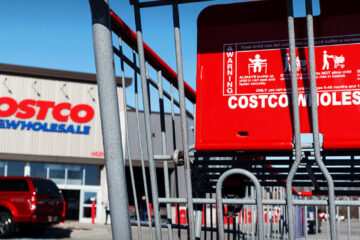Most business owners do not have to think about anything other than their own reputation. People probably won’t stop eating.at Legal Seafood because they don’t like the New England Patriots.
Related: Forget Rite Aid, another pharmacy chain shares new store closures
In most cases, a business gets judged on its own actions and not based on global concerns.
That, however, may not always be the case, as the United States has not exactly endeared itself to the rest of the world with President Donald Trump’s tariff plans. These tariffs have a real impact on economies around the world.
It’s possible that people will lose their jobs because the U.S. imports fewer items from their country. That makes the United States a villain, at least to some people.
💵💰Don’t miss the move: Subscribe to TheStreet’s free daily newsletter💰💵
That leads to the question of whether brands that have a close association with the U.S. will suffer. McDonald’s CEO Chris Kempczinski actually addressed this issue during his chain’s most recent earnings call.
Many people see McDonald’s as the quintessential American brand.
Image source: Justin Sullivan/Getty Images
McDonald’s is a global empire
Kempczinski was asked about rising global concerns during the chain’s first-quarter earnings call.
“There are some rising concerns on international boycotts, generally speaking, as U.S. brands. So, I’m wondering if you have seen any signs of weakness attributable to that and how you’re expecting that to be evolving?” asked analyst Danilo Gargiulo.
The McDonald’s CEO actually gave an expansive answer.
“We’ve actually spent some time researching this, and we’ve done three different surveys, global surveys in all of our top markets to just assess the consumer’s perspective. And we acted in the context of three things. How does the consumer feel about America, the country? How does the consumer feel about American brands? And then, specifically, how does the consumer feel about McDonald’s?” he shared.
More Food News:
Popular breakfast restaurant chain menu adds deal amid closuresPopular restaurant chain’s massive change may anger customersWendy’s menu adds fast-fast food take on hot new trend
Those efforts did produce some positive news for the fast-food chain.
“And the good news from our perspective is that there has been no change in how the consumer globally feels about the McDonald’s brand. So, we’re not seeing any [anti] American sentiment have any impact on our business. What we have seen in our survey work is that there has been an increase in people in various markets saying that they are not going to be or they’re going to be cutting back their purchase of American brands,” he added.
McDonald’s may still feel the pain
Kempczinski did make it clear that there could be impact from how the world perceives American brands.
“And we’ve seen an uptick in anti-American sentiment, call it, 8 points to 10 points increase in anti-American sentiment, most pronounced in Northern Europe and Canada, not a big deal in Latin America, not a big change — or nothing that we’re seeing in Asia,” he added.
The burger boss does, however, expect his company to be resilient.
“But again, the key point here is, while there has been, I think, an uptick in general in anti-American sentiment, that’s had no impact on our business, and consumer sentiment toward the McDonald’s brands remained strong,” he said.
Retail expert Neil Saunders spoke broadly about the idea of anti-American sentiment harming American companies globally.
Related: Wendy’s makes move to take down McDonald’s, Burger King
“To an extent, yes. It is already happening in some countries, albeit at the margins. That said, I don’t think it is a widespread boycott in most geographies. The truth is that while many people do not favor American policies, they’re not using this as an excuse to shun all American brands. And, as ever, great products with a strong desirability factor helps to ward off this kind of problem,” he wrote on RetailWire.
Basically, you might be mad at America, but you still love the Big Mac.
Paula Rosenblum took a much more harsh attitude.
“I compare what is happening to the U.S. reputation to that of Germany and Japan after World War II. It took the rest of the world about 30 years (give or take) to trust them again,” she wrote. “…I’m not sure we realize yet how much damage has been done.”


